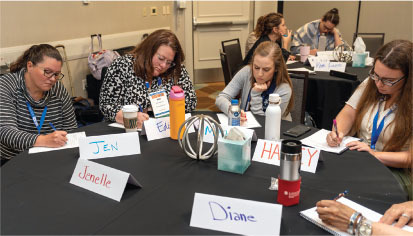March/April 2017
Leading Insight
Young Leaders Excel at Communication, Connection, Confidence, Study Says
What are the key attributes that will land a senior engineering student a top job offer? Engineering firm recruiters want to hire graduates with leadership skills demonstrated through activities outside of the classroom. But they also want new hires who can prove their abilities to communicate and connect with a high level of confidence.
According to a Pennsylvania State University study conducted during the 2015–16 recruitment season, engineers were in high demand for entry-level positions. Almost all engineering employers (96%) recruited new talent through college fairs, networking sessions, and on-campus interviews. The students most likely to get job offers were able to demonstrate nontechnical and technical competencies during this process. The recruiters interviewed for the study largely represented public companies and were looking primarily for students in five disciplines: mechanical (88%), electrical (73%), industrial (67%), computer science (39%), and chemical (36%).
The study was designed to assist engineering leadership educators with helping students to share their leadership experiences and qualities during the college campus recruiting process. In 2000, accreditation organization ABET began requiring engineering programs to integrate nontechnical competencies into the curriculum to address a soft-skills gap pointed out by industry.
Among the questions study participants were asked: What activities during college do recruiters value or perceive as building engineering leadership competence? And what behaviors during the recruiting process demonstrate the potential for engineering leadership competence?
Recruiters were most interested in candidates with relevant student organization involvement, internships/co-ops, and engineering project experience. Fifteen percent of recruiters also mentioned participation in an engineering leadership program as a desirable activity. While involvement in activities that demonstrate that a candidate has obtained experience will be valuable to the real world, recruiters also wanted to see that candidates had the ability to communicate effectively, connect during the process, and show confidence.
Communication
A student who demonstrates engineering leadership behaviors will communicate in ways that show a reflection and understanding of his or her personal leadership development. Experiences are important, but an ability to translate those from merely actions to learning opportunities demonstrates potential for engineering leadership. Recruiters also noted that engineering leadership behaviors related to communication included an ability to talk about leadership outside of holding a position.
Making a Connection
The ability of a candidate to connect experiences and interest to a particular job opening or company was found to be a strong indicator of engineering leadership. Students who could hold a comfortable conversation with a recruiter, combined with genuine interest in the career opportunity, stood out to recruiters. This led to a perception that the students knew what they wanted and fully understood how their experiences connected to the firm.
Confidence
A high level of confidence shown through eye contact, professional dress, calmness, and a firm handshake were marked as behaviors that demonstrate a potential for engineering leadership. Recruiters indicated that they understand how tough the career fair setting can be for students and for the characteristics of confidence to shine through is a strong indicator of engineering leadership qualities.
The study recommends that engineering leadership programs provide opportunities for students to build confidence in all aspects of engineering competencies. This may involve reviewing research on self-confidence and self-efficacy to provide more insights into building confidence into engineering leaders.
“Identifying Engineering Leadership Potential During the On-Campus Recruiting Process” is a study conducted and presented by Meg Handley, associate director for Engineering Leadership Outreach; Dena Lang, associate director of the Engineering Leadership Research Program; and Andrew Erdman at Pennsylvania State University.
NSPE Resources for Leadership Success
NSPE provides students free national membership, scholarship opportunities, free products, and online webinars to show them how to map out their careers and get on the path to PE licensure. The Society also offers a graduated dues program for recent graduates of ABET-accredited engineering programs. Access these resources at www.nspe.org/resources/students.
Students and EITs alike can also boost their engineering leadership skills with guidance from the NSPE Professional Engineering Body of Knowledge. The report provides a comprehensive list of knowledge, skills, and capabilities to assist them in evaluating their engineering experience. It also offers engineering mentors and supervisors a template to assess the experience gained by young engineers and highlights other areas of experience that may be required for success as an engineering professional. Access the Engineering Body of Knowledge at www.nspe.org/ebok.


 Volunteering at NSPE is a great opportunity to grow your professional network and connect with other leaders in the field.
Volunteering at NSPE is a great opportunity to grow your professional network and connect with other leaders in the field. The National Society of Professional Engineers (NSPE) encourages you to explore the resources to cast your vote on election day:
The National Society of Professional Engineers (NSPE) encourages you to explore the resources to cast your vote on election day:




